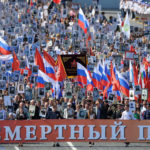After having fought off popular rejection of its neoliberal economic policies that serve its own interests, the European establishment has lost its first major election, as Andrew Spannaus reports.
Tag: France
The EU Will Not Stand by Iran
While European leaders have made noises that they will defy Donald Trump’s reneging on the Iran nuclear deal and resist U.S. sanctions, in the end the Europeans will give in to U.S., argues Alexander Mercouris in this commentary.
Iran Deal Partners Mull How to Confront ‘Renegade’ U.S.
Trotskyist Delusions: Obsessed with Stalin, They See Betrayed Revolutions Everywhere
The trouble with some Trotskyists is they’re always “supporting” other peoples’ revolutions, says Diana Johnstone. Their obsession with permanent revolution in the end provides an alibi for permanent war.
Macron Cracks Down on French Liberty
Exclusive: The youthful new French President Macron is getting rave press reviews, with little attention to his clampdown on public liberty under the guise of fighting terrorism, reports Jonathan Marshall.
European Union’s Democracy Dilemma
Exclusive: The European elites want the European Union as a means for controlling the Continent’s economies, but that often requires overriding the popular will of nation states, a dilemma for “democracy,” explains Andrew Spannaus.
France Circles Back to Status Quo
Though the names are different, the French election is playing out much like the last one when a candidate who might have brought change was brought down by scandal, opening the way for the same-ol’ policies, writes Gilbert Doctorow.
Populism v. Elites in French Election
Exclusive: Popular resistance to neoliberal economic policies gets its next test in Sunday’s election in France with two populists from the Right and Left challenging two mainstream candidates, explains Andrew Spannaus.



